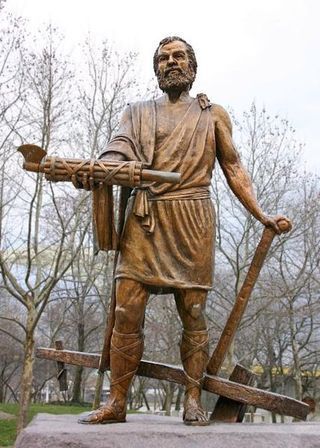Better a dictator than a technocrat
You can see the problem for Italy and Greece. But to go from the mad excesses of (what turned out to be) foolish democracy, to the de facto imposition of an entirely unelected leader (approved, no doubt, by the Eurocrats) seems a bit of a 'frying-pan-into-the-fire' situation.
Sure, sensible political systems have some fall-back position for how to cope in a crisis, when the usual democratic arrangements are in danger of simply not managing. The Republican Romans had the institution of 'dictatorship', which on balance seems a better option than these technocrats (a term which is not far short of a euphemism for "banker")
The trouble about 'dictator' is that the institution got nastily tainted in the first century BC by Lucius Cornelius Sulla and Julius Caesar -- both of whom in their different ways, hijacked the office for long term, autocratic one man rule, and radical political reform (ultimately to the benefit of themselves and/or their faction). That's the sense that 'dictatorship' still has.
But before that, it really was a short term emergency office; certainly not sinister.
One of the basic principles of politics in Republican Rome was that political office was always SHARED. Noone held political office independently, but always with a colleague. So even the very highest office, the consulship, was shared between two men. (This was largely an attempt to safeguard the political system against anyone making himself a king.) Sometimes however, for the most part when the Romans were facing a particularly tough military opponent, there was a feeling that 'joint command' (for the consuls acted as military generals as well as civilian politicians) wasn't going to bring off victory; that one man was needed to make the big decisions on their own, not in committee. On those occasions, a 'dictator' was nominated by the senate or consuls themselves. They were to serve for an absolute maximum of six months, and were supposed to lay down the office anyway once the crisis had passed.
One of the most famous of these dictators was Cincinnatus (whose name lies behind the city of Cincinnati). In our terms he was a right wing ideologue, but was a hero of propriety when it came to the dictatorship. Having been consul in the past, he accepted the senate's request that he become dictator while working on his farm ("Cincinnatus called from the plough" as his tag-line went), and as soon as he had secured the victory, he laid the office down. The modern sculpture at the top shows him giving back the symbols of the dictatorship (the fasces) and returning to the plough.
The advantages of this over the technocrats? For a start, the time period for the suspension of democratic government is strictly limited. Secondly, this wasnt the flying in of someone outside the political process; dictators were generally senior figures who had previously been democratically elected to political office.
Pity the 'dictatorship' got abused and got a bad name. Come to think of it, maybe "technocrat" will have become a term of abuse in a thousand years time.
Mary Beard's Blog
- Mary Beard's profile
- 4114 followers




